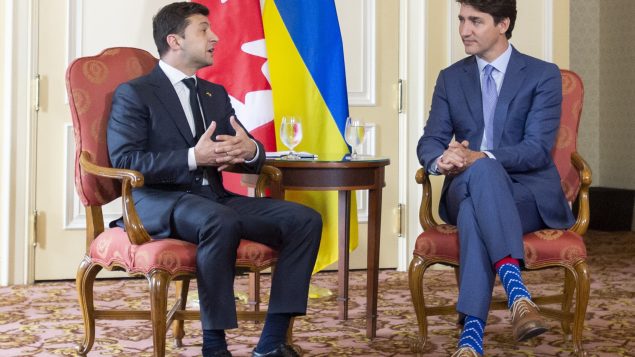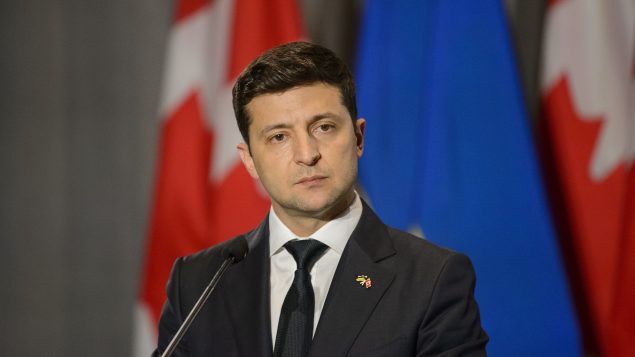Canada will not recognize passports issued by Russia to Ukrainian citizens in rebel-held areas of Eastern Ukraine, Foreign Affairs Minister Chrystia Freeland announced Tuesday.
Speaking to reporters at the conclusion of the Ukrainian Reform Conference ministerial meeting in Toronto, Freeland said Canada is taking concrete action against continued Russian aggression in Ukraine and condemns the Kremlin’s decision to issue Russian passports to Ukrainian citizens in the Donbas region.
“As of today, Canada will take action to ensure these passports cannot be used to travel to Canada,” Freeland said.
Tens of thousands of Ukrainians have left the Russian-speaking parts of eastern Ukraine that are currently controlled by pro-Russian rebels in search of better work opportunities in Russia over the past 25 years, long before the conflict in the Donbas region began in 2014.
A response to ‘an act of further aggression’
It’s not clear how the new rules will distinguish between those who left eastern Ukraine before the conflict began and have since become Russian citizens and those who were granted citizenship since Moscow began issuing passports in June.
“This is not about legitimate holders of Russian passports nor is this measure directed in any way to prevent people from living in occupied Donbas from coming to Canada,” Freeland said.
“People who are citizens of Ukraine, which is the case for people living in occupied Donbas, are very welcome to apply for a visa to come visit Canada, using their Ukrainian passport.”
It’s also not clear how people living in rebel-controlled areas can get Ukrainian passports given the logistical difficulties of having to cross an active frontline to get to the government –controlled areas of Ukraine to apply for new travel documents.
Canada considers the issuance of Russian passports to Ukrainian citizens of Donbas “to be a further act of aggression against Ukraine,” Freeland said.
Canada strongly condemned Russia’s decision to issue passports to Ukrainian citizens in Donbas when it was first announced in late April, Freeland said.
“We, however, think condemnation is not enough and because we believe these passports to be illegitimate, it’s important for us to act on that belief,” Freeland said. “I’m not going to go into technical specifics but let me assure you that this is something that our excellent immigration officials have gone through very carefully.”
Canadian officials have also discussed the measure with some of the like-minded countries that attended the conference in Toronto and have been sharing with them some of the technical know-how of implementing the ban, she said.
“And we very much encourage our partners to share our support for Ukraine’s sovereignty and territorial integrity to join us in taking this step,” Freeland said.
Officials at the Russian embassy in Ottawa could not be reached for comment in time for publication.
$45 million to further reforms
Canada will provide more than $45 million in additional funding to Ukraine over the next six years, Freeland announced.
Of that sum, $25 million will go towards funding governance reforms in Ukraine; $6.5 million towards police training projects; $6 million towards institutional and strategic defence reform; $5 million will go towards creating mobile services for Ukrainian citizens in rebel-controlled areas; and $3 million towards gender equality and women’s empowerment projects.
Ottawa also committed to expand and extend its police deployments to Ukraine to 2021. Canada will send up 45 police officers to Ukraine to provide training and strategic support for Ukrainian law enforcement, Freeland said.
The next Ukraine Reform Conference will be held in the Lithuanian capital of Vilnius, she said.
Zelenskiy’s North American debut

Canadian Prime Minister Justin Trudeau holds talks with Ukrainian President Volodymyr Zelenskiy at the Hotel Fairmont Royal York during the Ukraine Reform Conference in Toronto, on Tuesday, July 2, 2019. (Andrew Lahodynskyj/THE CANADIAN PRESS)
Earlier in the day, Canadian and Ukrainian officials in the presence of Prime Minister Justin Trudeau and newly elected President Volodymyr Zelenskiy signed the Joint Declaration on a Youth Mobility Arrangement, that once completed aims to facilitate youth study and work exchanges between Canada and Ukraine, as well as the Audiovisual Coproduction Treaty to create opportunities between Canada’s and Ukraine’s film, television and digital industries.
Canada will continue “to stand with Ukraine against Russian interference and aggression,” Trudeau assured his guest as the two leaders discussed Canada’s mission in Ukraine to train the Ukrainian military as well as the sale of lethal weapons to Kyiv.
The Liberal government cleared the last regulatory obstacle on the way of Canadian sales of lethal weapons to Ukraine in December of 2017 when Ottawa included Ukraine in the Automatic Firearms Country Control List (AFCCL).
The listing enables Canadian companies and individuals to apply for a permit to export certain prohibited firearms, weapons and devices to Ukraine.
Trudeau said a Canadian company has invested in an ammunition factory in Ukraine without providing additional details.

Ukrainian President Volodymyr Zelenskiy listens to Canadian Prime Minister Justin Trudeau at the Hotel Fairmont Royal York During the Ukraine Reform Conference in Toronto, on Tuesday, July 2, 2019. (Andrew Lahodynskyj/THE CANADIAN PRESS)
Zelenskiy, a former comedian and entrepreneur-turned-politician, thanked Trudeau and Canadians for the warm welcome he received on his first official visit to Canada.
Zelenskiy who had visited Canada previously with his comedy troupe admitted that even in his wildest dreams he never thought he would return to Canada as president of Ukraine.
He joked that he felt totally at home in Toronto until he walked into a restaurant and realized that prices in Canadian restaurants were cheaper than in Kyiv.
Zelenskiy, who got more than 73 per cent of the vote in this spring’s presidential election, easily unseating the incumbent, Petro Poroshenko, promised to accelerate the pace of reforms in Ukraine despite the external and internal challenges the country faces.
Minutes after his inauguration on May 20, Zelenskiy dissolved the country’s parliament and called for snap elections scheduled for July 21.
A caretaker government loyal to Poroshenko and openly hostile to Zelenskiy continues to govern day-to-day life in Ukraine.







For reasons beyond our control, and for an undetermined period of time, our comment section is now closed. However, our social networks remain open to your contributions.